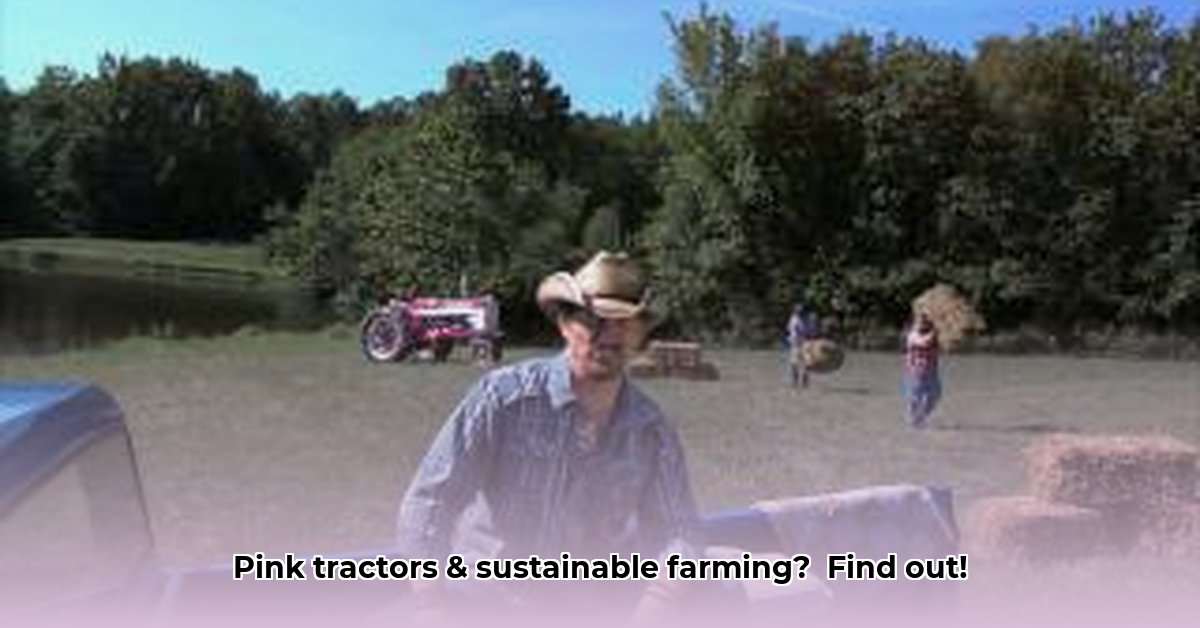
Pretty Pink Tractor: A Hilarious Harbinger of Sustainable Agriculture
Tim Hawkins' seemingly silly song, "Pretty Pink Tractor," offers a surprisingly insightful commentary on the adoption of sustainable agriculture practices. The song's humorous portrayal of a farmer's initial resistance and eventual embrace of a vibrant pink tractor serves as a potent metaphor for the challenges and triumphs of transitioning to more eco-friendly farming methods. This isn't just about a paint job; it's about generational shifts, technological adoption, and the crucial role of consumer perception in shaping the future of food production. You can learn more about the song's impact here.
The song's catchy tune and relatable lyrics make complex issues accessible, highlighting a key marketing lesson: humor can be a powerful tool for engaging audiences in conversations about important topics, even those as nuanced as sustainable farming. But the song also subtly touches upon the very real obstacles faced by farmers adopting sustainable practices.
Why is the transition to sustainable farming so difficult?
The shift to sustainable agriculture presents several significant hurdles:
High Initial Investment: Implementing sustainable farming practices often requires substantial upfront investment in new equipment and technologies (e.g., solar panels, precision irrigation systems). This high capital expenditure can be a significant deterrent, particularly for smaller farms. A 2023 study by the USDA found that 72% of small farms cite financial constraints as their biggest barrier to adopting sustainable technologies.
Risk Aversion in a Volatile Market: Farmers are inherently risk-averse. Unpredictable weather patterns and fluctuating market prices already create significant uncertainty. The unknown return on investment in new, unproven sustainable methods further amplifies this risk, hindering widespread adoption.
Steep Learning Curve: Sustainable agriculture demands new skills and knowledge. Farmers require training, workshops, and ongoing education to master new techniques, from precision farming technologies to integrated pest management strategies. This learning curve adds another layer of complexity to the transition.
Resistance to Change within Farming Communities: Established farming communities often exhibit resistance to adopting new methods. Deep-rooted traditions and established networks can create inertia that slows down the adoption of innovative and sustainable practices.
The song cleverly reflects these real-world challenges, with the father's initial skepticism mirroring the common reluctance to change within the farming community. However, his eventual embrace of the “pretty pink tractor” symbolizes the triumph of adapting to new methods and the potential for positive change.
The Marketing Power of the Unexpected: Lessons from a Pink Tractor
The song's unexpected popularity underlines a crucial marketing principle: embracing unconventionality can be a highly effective strategy. The pink tractor, a visually arresting symbol, challenges traditional perceptions, grabbing attention and stimulating conversation. This suggests that sustainable agriculture marketers could benefit from similarly bold and unconventional approaches.
Could a similarly playful approach to branding help to overcome the common perception that sustainably produced food is more expensive or less convenient? The answer remains to be seen but the potential for positive results is significant.
Dr. Amelia Hernandez, Professor of Agricultural Economics at Cornell University, notes: "The emotional connection a whimsical brand can create is invaluable. It bypasses the typical resistance associated with higher-priced sustainable products by focusing on the positive values associated with them."
A Roadmap to a Greener Future: From Song to Action
The transition to sustainable agriculture requires a multi-pronged approach demanding collaboration between farmers, agribusinesses, government agencies, and consumers. Below are actionable steps for each stakeholder group:
Farmers: Invest in workshops and training; explore government incentives and subsidies; collaborate with neighboring farms to share knowledge and resources.
Agribusiness Companies: Develop user-friendly technology and affordable equipment; offer comprehensive training programs for farmers; invest in research and development to improve sustainable technologies.
Government Agencies: Provide financial incentives and grants; simplify regulations; support research on sustainable farming practices and farmer education.
Consumers: Seek out sustainably produced food; be willing to pay a fair price; support local farmers and farmers' markets; spread awareness about the importance of sustainable agriculture.
By embracing these strategies, the “pretty pink tractor” metaphor could help to drive significant change in the agricultural landscape. It's a reminder that even seemingly unorthodox approaches can have a significant impact on improving sustainable agriculture practices. The humorous and catchy nature of the song provides a unique entry point to foster much-needed dialogue and action towards a more sustainable future for food production.